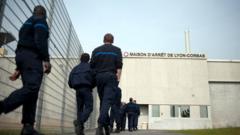Amid a growing scrutiny of behavior at the remote Sanae IV base, South African authorities have opted against removing any personnel following allegations of serious misconduct.
South Africa Declines to Remove Antarctic Scientists Amid Assault Allegations

South Africa Declines to Remove Antarctic Scientists Amid Assault Allegations
South Africa's environment officials affirm that no immediate evacuation of researchers is planned despite reported assault and harassment claims at an Antarctic research station.
South Africa's environment minister, Dion George, announced on Tuesday that the government would not proceed with the evacuation of researchers from the Sanae IV base in Antarctica, where allegations of physical assault and sexual harassment have emerged against one of the scientists. The minister stated, “There were no incidents that required any of the nine overwintering team members to be brought back to Cape Town,” asserting that all operations at the base were “calm and under control.”
The allegations were reported last month, prompting an investigation by South African authorities. However, the geographical isolation of the scientists—approximately 2,700 miles from the nearest major city—combined with the harsh Antarctic climate, poses significant challenges to oversight and communication. The extreme conditions prevalent on the continent, including limited infrastructure and prolonged periods of darkness, often complicate attempts at accountability for researchers who may engage in inappropriate conduct.
Jane K. Willenbring, currently a professor at Stanford, shared her experience of harassment during her time as a graduate student in Antarctica two decades ago, highlighting the ongoing challenges of addressing misconduct effectively in such an isolated environment. Reports of crime and misconduct, though not ubiquitous, have become increasingly acknowledged within the scientific community conducting research in this desolate region.
The South African environment department’s decision to maintain the team in Antarctica raises questions about the policies in place for handling allegations of misconduct in remote research locations, as the scrutiny on such matters intensifies.
The allegations were reported last month, prompting an investigation by South African authorities. However, the geographical isolation of the scientists—approximately 2,700 miles from the nearest major city—combined with the harsh Antarctic climate, poses significant challenges to oversight and communication. The extreme conditions prevalent on the continent, including limited infrastructure and prolonged periods of darkness, often complicate attempts at accountability for researchers who may engage in inappropriate conduct.
Jane K. Willenbring, currently a professor at Stanford, shared her experience of harassment during her time as a graduate student in Antarctica two decades ago, highlighting the ongoing challenges of addressing misconduct effectively in such an isolated environment. Reports of crime and misconduct, though not ubiquitous, have become increasingly acknowledged within the scientific community conducting research in this desolate region.
The South African environment department’s decision to maintain the team in Antarctica raises questions about the policies in place for handling allegations of misconduct in remote research locations, as the scrutiny on such matters intensifies.






















